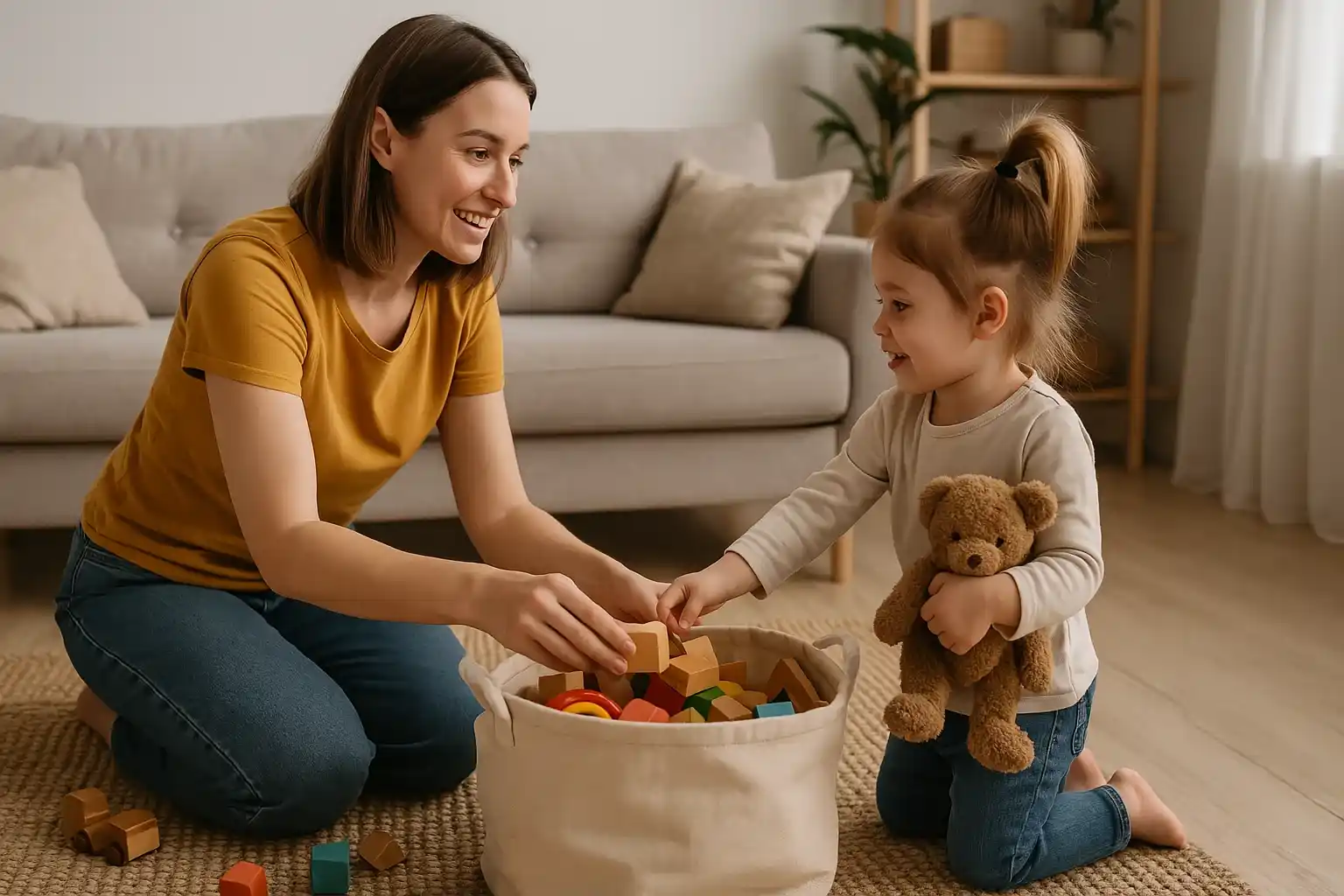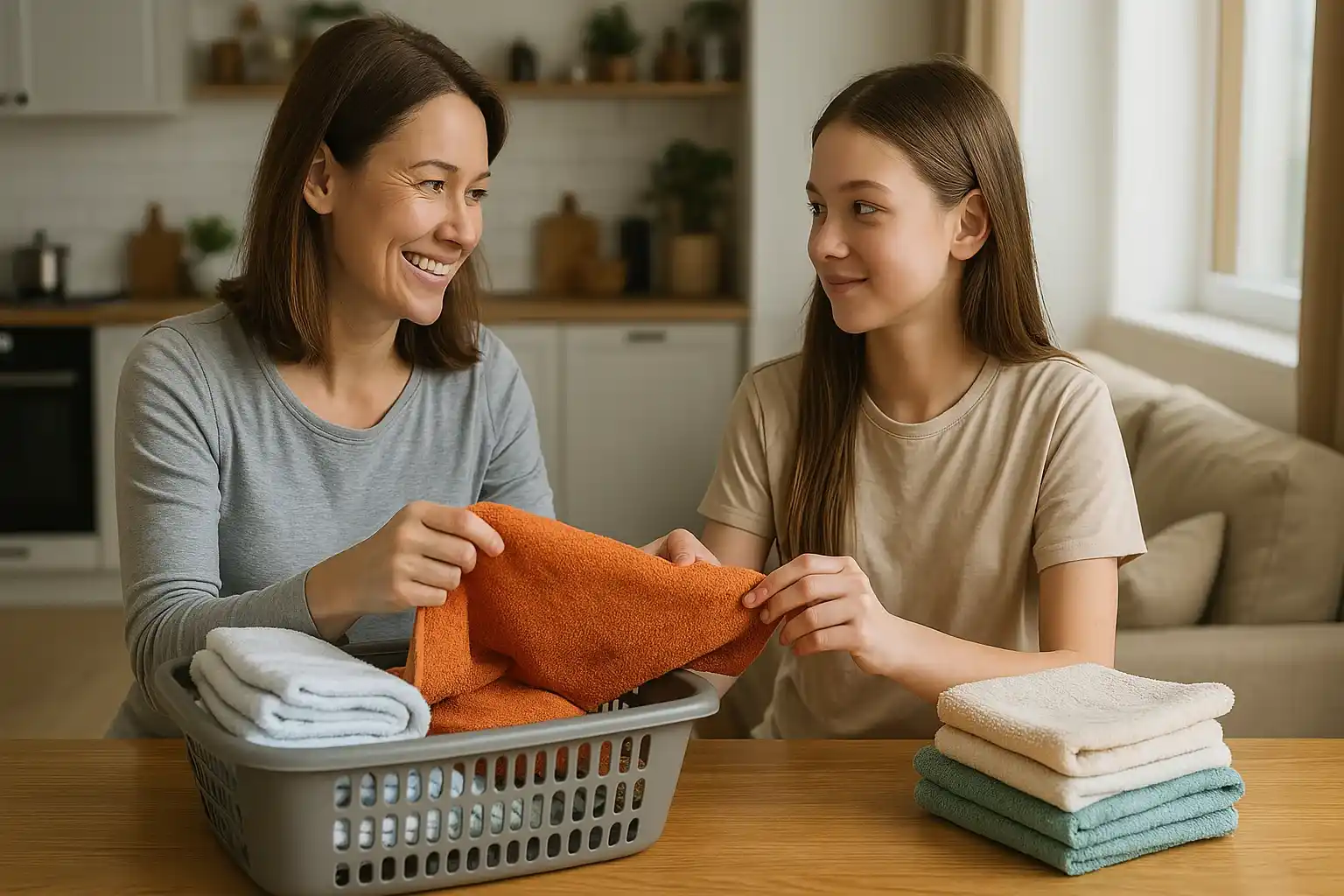Life in a family with children is not just logistics and cleaning, but a field for developing responsibility and independence. When a child grows up, parents are tempted to do everything themselves, because it is faster, cleaner and more familiar. But if you do not start to delegate at least simple tasks, the child risks growing up dependent and insecure.
It is important to understand: household chores are not a punishment, but a part of growing up, as it is a great opportunity for a child to feel their importance and learn to take care of themselves and others. Many parents are afraid of “missing out,” especially when the child goes outside the apartment. This is why phrases like “how to track a cell phone number” remain among the popular searches on the Internet. But the key here is not in total control, but in a competent system: both in everyday life and in digital security.
So today we are going to have an honest conversation about how to share household chores with children of different ages, so as not to overload them (and yourself), but at the same time to develop useful skills and build trust.
Ages 3–5: Building Participation Through Play
At this age, children are full of energy, curiosity and a strong desire to be close to their caregivers. They love to imitate adults – grabbing brooms that are bigger than themselves, reaching for laundry baskets, or pretending to cook. This is the perfect time to introduce them to chores – not as a task, but as a fun game and what you can start with you may find below.
Step 1: Do Chores Together and Make Them Fun and Predictable
A great way to get toddlers involved is simply by letting them help you. For example, if you are folding laundry, give them the job of matching socks. If you are cooking, let them wash veggies or stir the batter with your hand over theirs. Even with small tasks like wiping the table or holding the dustpan while you sweep, you will show them a routine without pressure. And please be patient and remember that a three year old will not do something perfectly, and the goal is not about that at all, but about making your little one part of the action.
And here you also need to remember that kids thrive on repetition, so turn chores into fun rituals. Here are some ideas:
- Picking up toys before bed
- Carrying their plate to the sink after meals
- Putting shoes in the closet after playtime
These routines create structure, making your kids feel more secure and helping them remember tasks. You can even add a fun twist like singing a clean-up song or setting a timer to make it feel like a race.
Lifehack: Use a “chore jar”! Write down small tasks on slips of paper and put them in a jar. Let your child pick a task every day. Then read the paper with the task and do it together. Due to this you keep things exciting and let your child feel in control of the chores, all while learning responsibility.

Step 2: Praise the Effort, not the Result
If your child’s first try at wiping down the table leaves more crumbs than a clean surface, don’t worry! What matters is that they are trying. Praise their effort and enthusiasm, like saying, “Great job putting your blocks away all by yourself!” This kind of encouragement motivates them to keep helping, without focusing on the perfect result.
Fun Fact: Did you know that kids between 3-5 years old learn best when they are engaged in activities with you? Research shows that children in this age group pick up more skills when they actively participate rather than just watch. So, turning chores into fun tasks to boost their development.
Ages 5–10: Building Responsibility Through Routine
When children reach school age, they begin to develop cognitive skills, motor skills, and an understanding of routines. This stage is the ideal time to move from playful imitation to real responsibilities. Children at this stage are eager to help and able to take on important tasks, so it is a good time to assign them real tasks and expect results.
Step 1: Assign Simple, Consistent Duties
Children thrive when they know what to expect. That is why you should give them consistent, repeatable tasks that work so well. Here is a quick table to get you started:
| Task | Age range | Example |
| Feed the pet | 5-6 years old | Feed the cat every morning |
| Set the table | 7-10 years old | Set the table before dinner |
| Take out the trash | 8-10 years old | Take the trash out on collection day |
These tasks should become a regular part of their day. Kids love having a job they can own and master. Due to repeating these duties and achieving some results they will be able to take pride in their work, and even boost their self-esteem and social skills.
Step 2: Visualize the System
This is a great time to build a simple chore system. It doesn’t need to be complicated – just something easy to see and track. Below are some ideas:
- Create a colorful weekly chart to track tasks
- Use a magnetic board or task cards with stickers
- Let them move a magnet or place a sticker after completing a chore
Having a visual representation helps kids understand their responsibilities and the key here is to make it fun and clear, not stressful. And remember, it’s okay if a task is missed, as it is inevitable: something will get spilled, forgotten, or done halfway. And that is okay. What matters more here is how we (adults) respond. Instead of scolding, use it as a chance to talk and solve the problem together
Lifehack: Want to keep things fresh and fun? Let your child pick a “chore of the week” they can focus on and become an expert in. Due to this you can give them something to look forward to and add some variety to their routine.
Ages 10–15: Gaining Independence with Supervision
When children enter their teens and young adulthood, things start to change: now they crave independence, want to make their own decisions, and expect to be taken seriously. It may seem like these changes happen overnight, but really it’s just a natural result of the trust and habits you’ve developed over the years of living together. So now, as a parent, you need to give them more freedom without giving up control or help completely.
Step 1: Give Them More Responsibility and Help to Manage the Time
This is the time to let kids take on real-world tasks that connect to their daily lives. Below you may refer to a list of some great examples:
- Your 11-year-old can make breakfast for the family on weekends.
- Your 13-year-old can take charge of grocery shopping with a list and budget.
- Your 14-year-old can manage their own laundry once a week.
But as a parent you need to remember that at this age, the challenge is not so much about completing the task – it is about doing it on time. Thus, instead of constantly reminding them, just encourage your child to plan their own schedule. Let them decide when to clean their room, walk the dog, or do homework. These little decisions teach them to prioritize and understand consequences without any drama.

Step 2: Support with Smart Tools
As your child begins to navigate the world more independently, be it running errands, staying after school, or going to a friend’s house, peace of mind becomes important for parents. This is where digital tools like Number Tracker come in. The app has user-friendly interface, location history, joint routes feature and even built-in AI assistant, so that the app allows you to check in on childs’ safety without being overbearing.
And remember that the goal is not in your constant surveillance, it’s about building trust with support. These tools help reinforce that independence doesn’t mean being isolated – it means having the freedom with the security of knowing they are always safe.
Tip: Be open about using these tools with your child. Transparency is key! So make sure you talk to him about sharing the app, its features and functions so that your child understands what to expect. It helps you to foster mutual trust and shows that it’s not about control, but about staying connected.
The Power of Small Steps
Well, now you know that sharing household chores is a great way for parents to keep the house organized and invest in the future, as children can develop important life skills and build confidence and independence. And your role here as parents is to support, encourage and step back in time for the kids to express themselves. After all, it is these small, daily tasks that shape their independent future.





